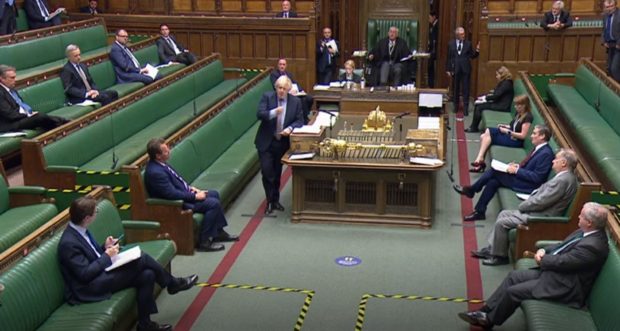I believe the UK is on the verge of a historic period of change. It won’t be the simplistic “let’s break it up” nationalism of the SNP; Britain has been too successful over the centuries to follow such a short-sighted policy.
But the need to reform our economy and the government structures that underpin it are vital if we are to get the full benefit of the industrial and scientific revolutions taking place before our eyes.
The pandemic has drawn attention to the inadequacies of our constitutional settlement. The recent track-and-trace system that stopped working when people crossed between Scotland and England was an example. That was not a failure of devolution, but an indication of why we need a structure that brings the UK back together again while continuing to devolve power closer to the people.
Together with others in Parliament and the wider community, I have been discussing changes needed to make full use of the new technologies that can help create a more equal society. We recently issued a statement suggesting the establishment of a convention to discuss the necessary changes.
Whether we need a convention to lead this discussion is open to question, but I have no doubt we need a new local and national government structure for the UK.
Dealing with a national crisis like the pandemic is not made easier when the mayor of Manchester, Andy Burnham, or Nicola Sturgeon in Scotland are engaged in a tug of war with Boris Johnson in London.
The lack of a devolved government in England aggravates the problem. That is why I welcome the growth of powerful city mayors in England. If some of the Scottish cities had the same powers, decisions could be made closer to the people most affected.
Scotland doesn’t benefit when local councils are forced to surrender powers to Edinburgh any more than England gains when too many decisions are taken in Whitehall. Devolution was not a mistake, but it is incomplete.
Powerful local government and industrialists in the 19th Century gave a major boost to the industrial revolution. Cities like Birmingham, Glasgow, Cardiff, and Belfast became engines of growth, with London providing the economic services necessary for national investment to support economic growth.
I see no reason why the same could not happen with the new digital revolution. Britain already hosts more hi-tech start-up companies than most of our competitors and it is important we continue to lead with this combination of hi-tech companies linked to universities and an efficient banking and finance system.
The trick is to get decisions made closer to people without losing the advantages of a single market and equal standards for citizens throughout the UK.
I think the direction of travel should continue the development of city and regional mayors and to continue devolution, while at the same time creating a chamber where all the governments and regions of the UK can focus on the co-operation necessary to ensure common standards for all.
Does this mean another layer of government? Not if we use our existing two-chamber Parliament better. The House of Lords does an excellent job revising and improving the Bills passed by the Commons. We should not lose that.
But there is no reason why a reformed second chamber could not be constructed to carry out both the revision of legislation from the Commons and the relationships between the devolved assemblies of the UK. What it needs is a major reduction in the number of Lords, combined with a method of selecting or electing members from the four countries of the UK and the regions.
This would allow devolution to continue while creating a national slimmed-down and efficient UK government dealing with the overarching issues like defence, foreign policy, and macroeconomic policy.
When first elected as an MP in 1979 it quickly became apparent to me that a large part of an MP’s job involved being a cross between a “big” local councillor and a social worker. MPs are being asked to do too many competing jobs when they should be dealing with the national and international issues, leaving local councils and assembly members to create the infrastructure necessary for a modern economy.
We can, and I believe will, create a more equal society using the emerging technologies, but we need a modernised governmental system to do it. It is time to start designing government structures for the new world – and, not for the first time, this unique union of the UK is well placed to deliver the necessary changes.
Clive Soley is a former MP and chairman of the Parliamentary Labour Party, who is now vice-chairman of the Scottish Peers Association and a member of the House of Lords EU Select Sub-Committee on Home Affairs. He lives in the Highlands.

